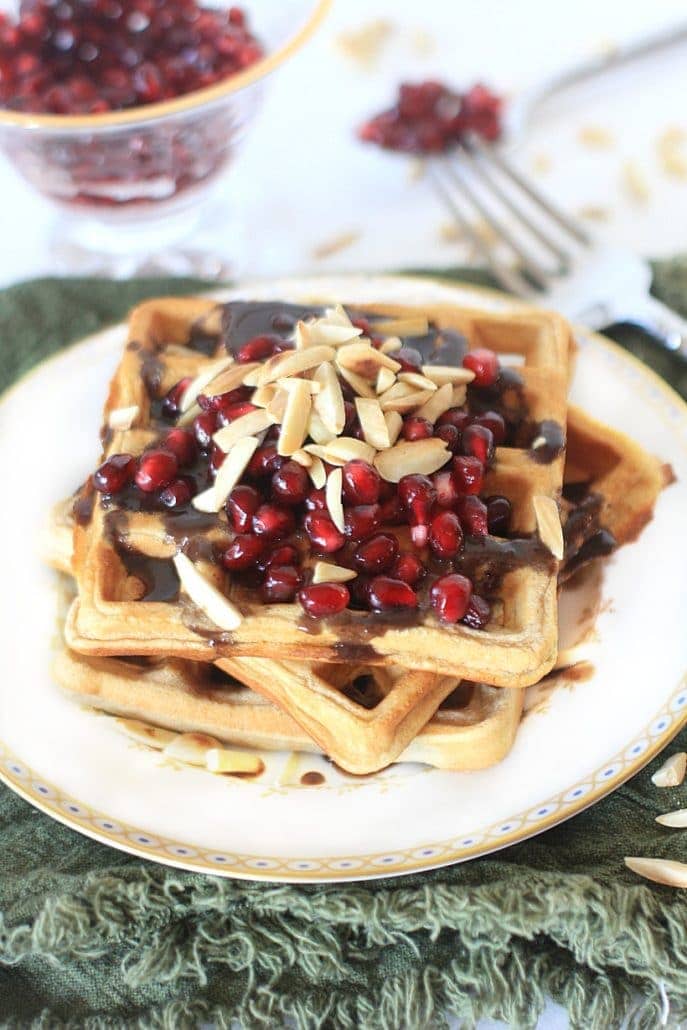10 Almonds a Day: Surprising Nutrition Facts & How to Eat Them
Get the scoop on eating 10 almonds, nutrition facts, top health benefits, and my favorite dietitian-approved ways to eat them!

Almonds, a must-have pantry staple (I buy them in bulk and keep ’em in my freezer), are delicious, versatile, and packed with impressive health and nutrition benefits.
Whether you need a protein boost, a satisfying heart-healthy snack, or a gluten-free alternative to wheat flour, almonds are a simple yet powerful addition to your diet.
10 Almonds Nutrition Facts
Calories in 10 Almonds
A serving of 10 almonds contains approximately 70 calories, making them a nutrient-dense snack that can provide lasting energy.
Protein in 10 Almonds
Almonds are a good source of plant-based protein. After peanuts (technically a legume), almonds contain the most protein of any nut. Ten almonds provide about 2.5 grams of protein, helping you stay full and support muscle growth and recovery.
10 Almonds Nutrition Facts: Carbs & Sugar
If you’re following a low-carb diet, almonds are an ideal snack. Ten almonds contain only about 2.5 grams of carbohydrates and less than 1 gram of sugar, making them an excellent choice for anyone managing blood sugar levels or cutting back on carbs.
Vitamin E: A Powerful Antioxidant
Almonds are a top source of vitamin E, a fat-soluble vitamin and powerful antioxidant. (1) Just ten almonds provide about 2.5 mg of vitamin or almost 1/4 of your daily vitamin E needs.
Essential Minerals: Magnesium and Calcium
Almonds are a good source of magnesium and calcium, two vital minerals for bone health, muscle function, and energy production. 10 almonds provide around 25 mg of magnesium and 30 mg of calcium.
What’s Better Than 10 Almonds a Day?

While eating 10 almonds daily is a great nutrition strategy, why not eat a whole 1/4 cup serving?! This is roughly 28 grams or 24 almonds, which provides:
- 170 calories
- 6 grams of protein
- 12 grams of fat (only 1 gram of saturated fat)
- 8 grams of carbohydrates
- 3 grams of fiber
- 1 gram of sugar
- 6% of daily calcium needs
- numerous health benefits noted below ⬇️
Almond Health Benefits

Healthy Fats for Heart Health
Almonds are rich in heart-healthy monounsaturated fats, which can help lower LDL cholesterol and support overall heart health. (2) The healthy fats in almonds make them a great alternative to processed snacks high in unhealthy trans fats.
Almonds Support Healthy Weight Management
Despite their calorie content, almonds are incredibly satiating and can help with weight management. Studies suggest that almonds’ combination of protein, fiber, and healthy fats (3) helps manage hunger throughout the day.
Almonds May Help Reduce Inflammation
The antioxidants and healthy fats found in almonds, particularly in their skin, may help reduce inflammation. Research suggests eating up to 60 grams of almonds daily reduces inflammatory markers. (4)
Dietitian tip! Unblanched almonds with intact skin are richer in antioxidants than blanched almonds. Eat the almond skin!
Eat Almonds for Digestive Health
A 1/4 cup serving of almonds has 3 grams of fiber to support a healthy gut microbiome.
In addition, for those with IBS or SIBO who are following a low FODMAP diet, almonds are low FODMAP at these servings: 10 whole almonds, 1 cup of almond milk, 1/3 cup of almond meal (flour), and 1 tablespoon of almond butter.
Almonds Support Brain Health
Almonds and other nuts are a key component of the MIND diet, a dietary pattern emphasizing specific brain-healthy foods for improved cognition and Alzheimer’s prevention. Aim to eat five servings of almonds and/or other nuts weekly for better brain health.
My Favorite Ways to Eat Almonds

Almonds are a versatile superfood that can be enjoyed in many ways. The possibilities are endless: raw, roasted, sliced, slivered, or in flour, milk, or almond butter. Here are some creative and delicious ways to enjoy them, inspiring you to get creative in the kitchen.
- Almond Crumbs. Swap regular bread crumbs with pulverized almonds for a tasty low-carb coating for meat, veggies, &other foods. They’re super simple to make at home. Or try my favorite Appel Foods Nut Crumbs with almonds, pecans, cashews, and seasonings.
- Almond Butter. Enjoy almond butter straight off the spoon, on rice cakes topped with sliced strawberries, or in this luscious homemade Mexican Chocolate Almond Butter.
- Almond Protein. Add almond protein powder to smoothies, oats, energy bites, and more. Two varieties to try are Noosh Unsweetened Almond Protein Powder and Naked Almond Protein Powder. Try it in these yummy Chocolate Chip No Bake Energy Bites!
- Almond Milk. While store-bought options have improved quite a bit, homemade almond milk is a cinch to make. This 1-minute Almond Milk Recipe is easy to make and free of gums and other additives.
- Almond Flour. It’s a staple in my gluten-free diet. Try it in these easy Almond Flour Berry Scones, this Ginger Peach Tart with Almond Flour, or my decadent Chocolate Almond Flour Cake.
- Slivered & Sliced Almonds. I love adding slivered or sliced almonds to salads. You’ll love my Strawberry Arugula Salad with Strawberry Vinaigrette, this Healthy Chopped Superfood Salad, or my Nourishing Quinoa Detox Salad.
- Chopped Almonds. Add chopped whole almonds to almost any sweet or savory dish. These No Bake Pumpkin Energy Bites are chock full of almonds, inside and out!
Did you learn anything new about the health and nutrition benefits of almonds? What are your favorite ways to eat them?
Did you enjoy this post?
Please leave your comments or questions and share this post with your friends and family. I truly appreciate your support!







